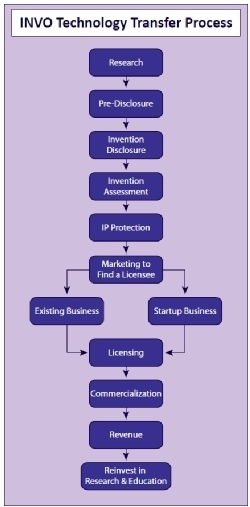
A culture of entrepreneurship has begun to crystallize at Northwestern University Feinberg School of Medicine.
Alicia Loffler, PhD, executive director of Innovation and New Ventures Office (INVO) and associate vice president of research, says she saw untapped potential for entrepreneurship at Feinberg and focused efforts to increase the amount of inventions, licenses, and startups generated from the medical school — especially in the area of medical devices.
“It’s amazing how much of an increase in activity we have had since last year,” said Loffler. “One of the efforts we have been doing at the university is putting infrastructure in place to keep the concepts coming in. We created the office to make sure the inventions got to the public.”
The INVO team scouts Feinberg for research that could have commercialization potential and provides guidance and resources for scientists and clinicians interested in bringing ideas and products to market.
In the past, the medical school has not been very active in developing startups: 36 startups have been created at Northwestern University, and only two have some affiliation with Feinberg. However, during the past year, the majority of potential startups have come from Feinberg.
“When we think of great medical schools, they all produce great innovations,” says Loffler. “The most important thing that entrepreneurs bring to the school is the ability to deliver research to the patient. You cannot do that unless you know how to bring the product to the market and commercialize it.”
The office aims to double the number of startups at the medical school in the next five years, and for Feinberg to be ranked as one of the top ten entrepreneurial medical schools by 2020.
INVO utilizes “entrepreneur residents” to oversee distinct innovation platforms such as therapeutics, chemistry, or software. One such platform, medical devices, has seen a threefold increase in inventions in the past year.
Maryam Saleh, PhD, invention manager at INVO, oversees the medical device initiative and the Center for Device Development (CD2). She attributes the increase in medical device inventions to a bio-design-inspired fellowship program where medical residents and biomedical engineers partner to assess and design solutions to needs in the industry.
“I’m excited because there is a lot of potential for Northwestern to be a part of the development of the medical device industry in the Midwest,” Saleh says. “These fellows promote an entrepreneurial ecosystem in the University and inspire faculty and students to innovate.”
The Center helps develop medical device ideas by partnering with product design firms and assists inventors to build a regulatory and reimbursement strategy.
“The faculty at Feinberg are all innovators. They come up with really great ideas and are excited about innovation. Surgeons and clinicians have a good understanding of a need and the market, but need help developing the concept and devices,” Saleh says. “Moving forward we would like to get to the point where we further develop the concepts into medical products, turning them into commercially viable technologies.”






